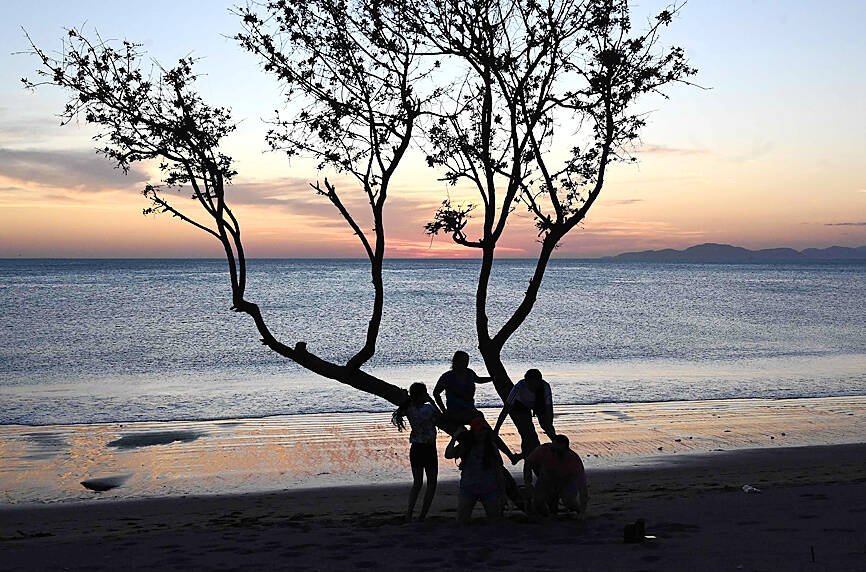The coastline of Cedeno, a fishing village in southern Honduras, looks like it was hit by an earthquake. Houses, businesses and clubs stand in ruins. Forsaken.
However, it was not a quake. Nor a tsunami. A much slower force is at work in Cedeno and other villages on the Pacific Gulf of Fonseca: sea level rise.
The ocean is claiming the protective mangrove forest off Cedeno’s coast and claws away at the land with sea surges.

Photo: AFP
Inhabitants of Cedeno and other fishing villages on the Gulf of Fonseca — shared by Honduras, El Salvador and Nicaragua — are at the forefront of sea level rise.
“The sea is advancing,” said Telma Yadira Flores, a 40-year-old homemaker from Cedeno who lost her house in a storm surge last year and now lives in a rickety shack with her son and daughter-in-law. The sandy beach is their kitchen floor.
“If the sea comes again, we will have to move. We will have to see where,” Flores told reporters.
According to the Committee for the Defense and Development of the Flora and Fauna of the Gulf of Fonseca (Coddeffagolf) non-governmental organization, the sea has advanced 105m into Cedeno, a settlement of about 7,000 people, in 17 years.
Apart from numerous homes and small businesses, a marine laboratory, police headquarters and a park were also abandoned to the waves.
The Michel Hasbun Elementary School, which once served about 400 children, now stands empty.
“There was a soccer field, it was lost,” Sergio Espinal, a 75-year-old fisherman, told reporters, pointing to where it once stood. “There were good restaurants, good hotels.”
The community has also had to contend with dwindling fish numbers.
The mangroves whose roots act as nurseries and hunting grounds for crustaceans, shellfish and many other species that in turn serve as food for bigger animals, are under attack from rising sea levels.
“Before there were schools of dolphins, there were sharks, swordfish ... and now everything has been lost,” said boat operator Luis Fernando Ortiz, 39, as he pointed out the broken and abandoned mansion of a former vice president overlooking the idyllic turquoise waters.
The community’s hopes now rest on a Coddeffagolf project, still in the planning phase, to improve coastal surge protections and reforest the battered mangrove.
UN Secretary-General Antonio Guterres this month said that sea level rise could force a mass exodus “on a Biblical scale” as people flee low-lying communities.
“The danger is especially acute for nearly 900 million people who live in coastal zones at low elevations — that’s one out of 10 people on Earth,” Guterres told the UN Security Council.
“Low-lying communities and entire countries could disappear forever,” he said.
The UN’s Intergovernmental Panel on Climate Change (IPCC) said that all mangrove forests could be lost in the next 100 years.
Mangroves not only sustain sea life, but also help protect coastlines from storms and surges.
Central America’s Atlantic and Pacific coasts “are some of the most endangered on the planet with regard to mangroves, as approximately 40 percent of present species are threatened with extinction,” the IPCC said.
Leaders of government, the private sector, civil society and academics this week are to gather in Panama for the “Our Ocean” conference to discuss how to save under-pressure marine resources.

The collapse of the Swiss Birch glacier serves as a chilling warning of the escalating dangers faced by communities worldwide living under the shadow of fragile ice, particularly in Asia, experts said. Footage of the collapse on Wednesday showed a huge cloud of ice and rubble hurtling down the mountainside into the hamlet of Blatten. Swiss Development Cooperation disaster risk reduction adviser Ali Neumann said that while the role of climate change in the case of Blatten “still needs to be investigated,” the wider impacts were clear on the cryosphere — the part of the world covered by frozen water. “Climate change and

Poland is set to hold a presidential runoff election today between two candidates offering starkly different visions for the country’s future. The winner would succeed Polish President Andrzej Duda, a conservative who is finishing his second and final term. The outcome would determine whether Poland embraces a nationalist populist trajectory or pivots more fully toward liberal, pro-European policies. An exit poll by Ipsos would be released when polls close today at 9pm local time, with a margin of error of plus or minus 2 percentage points. Final results are expected tomorrow. Whoever wins can be expected to either help or hinder the

Packed crowds in India celebrating their cricket team’s victory ended in a deadly stampede on Wednesday, with 11 mainly young fans crushed to death, the local state’s chief minister said. Joyous cricket fans had come out to celebrate and welcome home their heroes, Royal Challengers Bengaluru, after they beat Punjab Kings in a roller-coaster Indian Premier League (IPL) cricket final on Tuesday night. However, the euphoria of the vast crowds in the southern tech city of Bengaluru ended in disaster, with Indian Prime Minister Narendra calling it “absolutely heartrending.” Karnataka Chief Minister Siddaramaiah said most of the deceased are young, with 11 dead

DENIAL: Musk said that the ‘New York Times was lying their ass off,’ after it reported he used so much drugs that he developed bladder problems Elon Musk on Saturday denied a report that he used ketamine and other drugs extensively last year on the US presidential campaign trail. The New York Times on Friday reported that the billionaire adviser to US President Donald Trump used so much ketamine, a powerful anesthetic, that he developed bladder problems. The newspaper said the world’s richest person also took ecstasy and mushrooms, and traveled with a pill box last year, adding that it was not known whether Musk also took drugs while heading the so-called US Department of Government Efficiency (DOGE) after Trump took power in January. In a